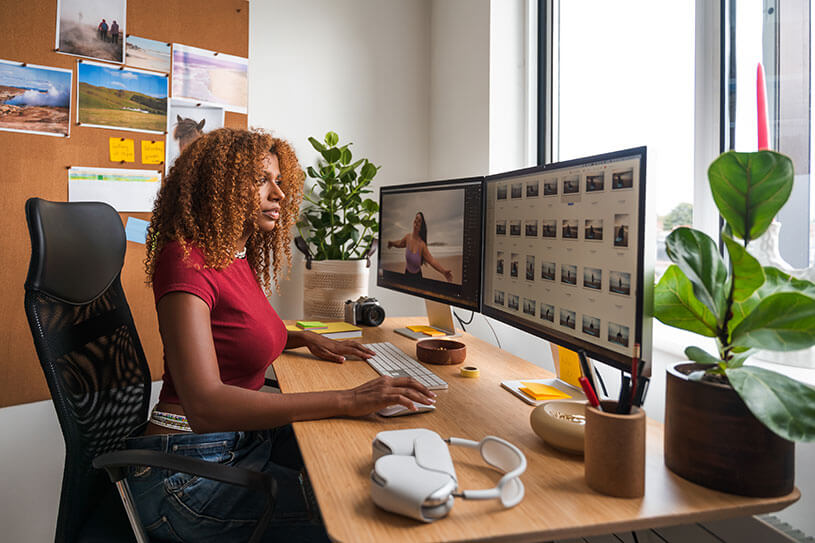Wondering the best way to start using images in your marketing? And how about finding royalty-free images to make your website stand out? Whether you’re taking your own photos or using stock photography, it’s important to understand image copyright laws in the UK.
Images are central to creating a brand and marketing your small business online and in print – from website pages and social media posts to flyers and business cards. And whatever your trade, you’ll probably start out looking for free images that are kinder on your budget.
Consistency, creativity, and copyright laws…
Using images in a creative and consistent way can elevate your brand and attract more customers. If you feel daunted by picking up a camera to take your own photos, you might be considering using photos you find online – from a stock library for example.
But just like with books, songs, and films – photos and images are copyrighted too. This means any unauthorised use of an image can lead to costly legal fees.
Here’s a few things to remember when choosing your images:
Consistency – you want your images to reflect your brand identity, perhaps in how you feature real people or colours in the image. A consistent style helps build trust among your audience and create a memorable brand.
Creativity – try to avoid images that look too ‘staged’. An image should tell a story and choosing authentic photos to represent your product or service is crucial to promoting your business.
Copyright – make sure you have permission to use the images you find online. You might pay for it or add a photo credit whenever you use it, or permission could come as part of a platform subscription price.
Read more about intellectual property law, and how to protect copyright of your own images.
What are the copyright rules for images?
The government has published a copyright notice to help people – particularly small businesses – understand the complexities of copyright law.
Using digital images and photos on the internet – this notice explains how these images are considered ‘artistic works’ and you’ll need permission from the owner of the copyright if you want to copy or share the image online.
Here’s a few things to consider:
- most images online are likely to be protected by copyright law, so it’s important you acknowledge the copyright owner if using the work
- use your own images and photos however you like (unless it’s a photo of protected work, for example)
- check image copyright terms
If you’ve used a professional photographer to take marketing images for your business, you’ll need to check the photographer’s terms of use. These licence terms are agreed when you negotiate the contract.
How do I know if a photo is copyrighted?
An image is copyright protected for the whole life of the creator – plus 70 years after the end of the calendar year they died. This means if an image was created less than 70 years ago then it’ll definitely be protected under copyright law.
Copyright and social media images
Image copyright laws are the same for social media as they are for images used elsewhere. This means you’ll need permission from the creator before sharing someone else’s image on your social channels.
You shouldn’t post content that infringes on someone else’s intellectual property rights. For example, Instagram says: “The best way to help make sure that what you post to Instagram doesn’t violate copyright law is to only post content that you’ve created yourself.”
However, using the in-built share and repost functionality isn’t a copyright infringement.
Having a social media policy can help you and your team stay within the law.
How to give image credit
There’s a few ways to give image credit. You might do a mix of these depending on the small print:
- add a credit next to the image whenever you use it. This can simply be something like: Photo: [name of photographer/artist, source]
- pay – when buying from a stock library or photographer (though sometimes you’ll still be required to credit the photographer, so always check the terms and conditions of the platform you used)
- check you have the right to use images for commercial purposes (for example, advertising on your business website)
Image licensing
Creative Commons has a range of licences that let you use and share images under copyright law. Some are for non-commercial use, so make sure you choose a licence that allows you to use images for commercial purposes.
You can also get licences from online stock libraries when buying an image or a subscription.

Photograph: Rawpixel.com/stock.adobe.com
How to find royalty-free images
‘Royalty-free’ means it’s a copyright free image, so you don’t need to have a licence or pay royalties to use the asset.
Stock photography sites and subscription platforms are a good place to look for royalty-free images, such as:
- Creative Commons – as well as granting image licences, Creative Commons offers a database of free images you can use for marketing your business (just be sure to credit the creator)
- Flickr – this one’s been around for 20 years but is still a great place to go for royalty-free images – just make sure photos are tagged with a Creative Commons License for commercial use (you can filter this way when you’re searching)
- iStock – you’ll have to pay but iStock does offer royalty-free images. The basic subscription starts at £19 a month for 10 downloads, or you can buy a package of credits and pay as you go
- Canva – you can create assets with Canva or use existing templates, either for free or with a monthly subscription
- Pexels – get free stock photos with Pexels
- Unsplash – all images and photos on Unsplash are free to download and use to promote your small business
- Pixabay – these royalty-free images can be used for editorial purposes, and sometimes commercially, depending on the licence the creator has chosen
- Shutterstock – a subscription plan starts at £19 a month, or you can buy download packages for one-off projects
Copyright and business insurance
Professional indemnity insurance can cover you if there’s a case of intellectual property infringement against you. Always check your policy wording and speak to your insurer to check what you’re covered for.
Simply Business can help you build a tailored business insurance quote so you only pay for the cover you need.
How do you use images to market your business? Let us know in the comments below.
More small business guides
- AI marketing – is this the future of your small business?
- Naming your business – how to do a UK trademark search
- Best social media tools for social media management
- What does professional indemnity insurance cover?
Looking for self-employed insurance?
With Simply Business you can build a single self employed insurance policy combining the covers that are relevant to you. Whether it’s public liability insurance, professional indemnity or whatever else you need, we’ll run you a quick quote online, and let you decide if we’re a good fit.
Photograph: Yakobchuk Olena/stock.adobe.com
